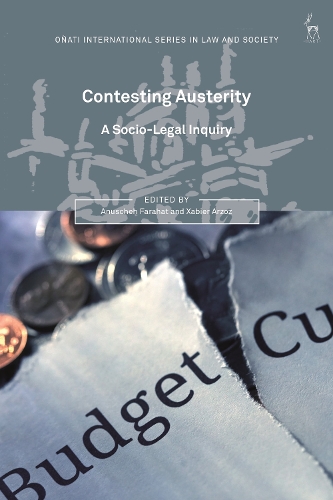
Contesting Austerity: A Socio-Legal Inquiry
(Paperback)
Available Formats
Publishing Details
Contesting Austerity: A Socio-Legal Inquiry
By (Author) Anuscheh Farahat
Edited by Xabier Arzoz
Bloomsbury Publishing PLC
Hart Publishing
23rd February 2023
United Kingdom
Classifications
Tertiary Education
Non Fiction
Social security and welfare law
Economic and financial crises and disasters
343.4034
Physical Properties
Paperback
368
Width 232mm, Height 154mm, Spine 20mm
560g
Description
This book addresses the different forms of austerity, contestation and resistance, in order to understand how they relate to one another and the impact they have on the democratic quality of public debates, the trust in public institutions and the legitimacy of law. Contestation of austerity includes not only traditional activism strategies such as human rights litigation and direct democracy instruments, but also new forms of collective action and collaborative resistance. Most importantly, many of the new anti-austerity initiatives also aim to renovate existing modes of democratic decision-making on the European, national, regional and local levels. The book focuses on different types of contesting austerity measures and the interaction between institutional and civil society actors. It will enhance understanding of how the various actors frame not only their goal but also the underlying social conflict to contest austerity and through which means they try to achieve political and legal changes. With 16 chapters written by contributors from Spain, Germany, Greece, Portugal and the UK, the book approaches 3 crucial areas of austerity policies: cuts in payment and pensions, labour law reform, and old and new poverty. In each field, the contributors analyse the processes of decision-making and contestation from 3 perspectives: institutions, democratic theory and societal responses.
Reviews
The book offers an essential contribution to both society at large and academia to reflect on and react to any hegemonic narrative that seeks to override social pluralism and reject the central meaning of conflict. If one assumes the intrinsic connection of law with social reality, the volume comprises an outstanding transformative potential. It is a highly recommended reading for anyone open to understanding that conflicts can hardly be reduced to the national framework alone, resolved exclusively by State power, and unleash their integrative potential in the absence of real transnational solidarity. -- Daniela Dobre * Heidelberg Journal of International Law *
Author Bio
Anuscheh Farahat is Professor of Public Law, Migration Law and Human Rights Law at the University of Erlangen-Nrnberg, Germany. Xabier Arzoz is Professor of Administrative Law at the National University of Distance Education (UNED) in Madrid, Spain.
